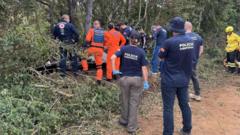After recent US strikes on key Iranian nuclear sites, citizens express a mix of anger, sorrow, and a desire for peace, while their government grapples with the consequences of escalated violence.
Iran Voices: Caught in Turmoil Amidst US Strikes

Iran Voices: Caught in Turmoil Amidst US Strikes
Personal accounts of Iranians reveal deep-seated fears and hopes following US airstrikes targeting their nuclear facilities.
In the wake of the recent US airstrikes that targeted three major nuclear facilities in Iran, citizens are voicing their fears and reflections on the escalating situation. One individual known as Shahla, who wishes to remain anonymous for safety reasons, shared her struggles with a sense of paralysis, stating, “My days and nights are the same. I feel paralyzed. I just stare at the ceiling all day and all night.” This sentiment captures the anxiety many Iranians feel as they are left wondering about the aftermath of the strikes.
US President Donald Trump announced that the Isfahan, Natanz, and Fordo facilities had been "obliterated" and presented Iran's leaders with a stark choice: "peace or tragedy." In stark contrast, Iranian Foreign Minister Abbas Araghchi condemned the strikes, declaring that the US had crossed a "big red line," and warned of potential long-lasting ramifications.
The airstrikes come on the heels of an extensive Israeli air campaign, which aimed at dismantling what it argued were immediate threats from Iran's nuclear and missile programs. Iran's health ministry reported more than 430 casualties, while an NGO estimated the toll may be double that figure. Iran retaliated by targeting Israeli cities with missiles, leading to the loss of 24 lives according to Israeli officials.
In a concerning twist to the conflict, Iranian authorities have restricted internet access, stifling the flow of information amidst this crisis. A woman named Mehri communicated her outrage via audio message to BBC Persian, expressing an unprecedented level of sorrow and anger. She contemplated the nature of war, suggesting it was largely shaped by leadership egos, referencing Trump, Israeli Prime Minister Benjamin Netanyahu, and Iran’s Supreme Leader Ayatollah Ali Khamenei.
Despite the grim circumstances, some citizens are resolute. Homayoun, from northwestern Maku, voiced defiance against US threats, asserting, "We'll stand by our country to the very end. And if needed, we'll give our lives for our homeland, for our honour." Following Trump’s warning of greater force in response to any Iranian retaliation, Araghchi reiterated Iran's right to defend its citizens and interests.
Iran's elite military division, the Islamic Revolution Guard Corps, highlighted perceived vulnerabilities in US bases located throughout the Middle East. Prior to the Israeli air strikes, Iranian officials had threatened retaliation against any US support in strikes on their nuclear program, arguing that such actions could lead to dire consequences for American assets in the region.
In a glimmer of hope, one Iranian reflected on the potential for de-escalation, acknowledging that conflict escalation would not be in Iran's interest. The individual, expecting a child soon, voiced hopes for a renewed Iran that promotes harmony domestically and internationally.
Reflecting on the financial toll of Iran’s nuclear aspirations, one citizen criticized the overarching priorities that have led to such strife, labeling the nuclear facilities as burdens rather than successes. The sentiment for change within Iran remains potent, with some advocating for internal reforms rather than foreign-imposed changes, emphasizing the need for a shift away from an authoritarian-focused governance strategy.
As the situation unfolds, the populace’s determination to steer their future amidst global tensions remains palpable.























